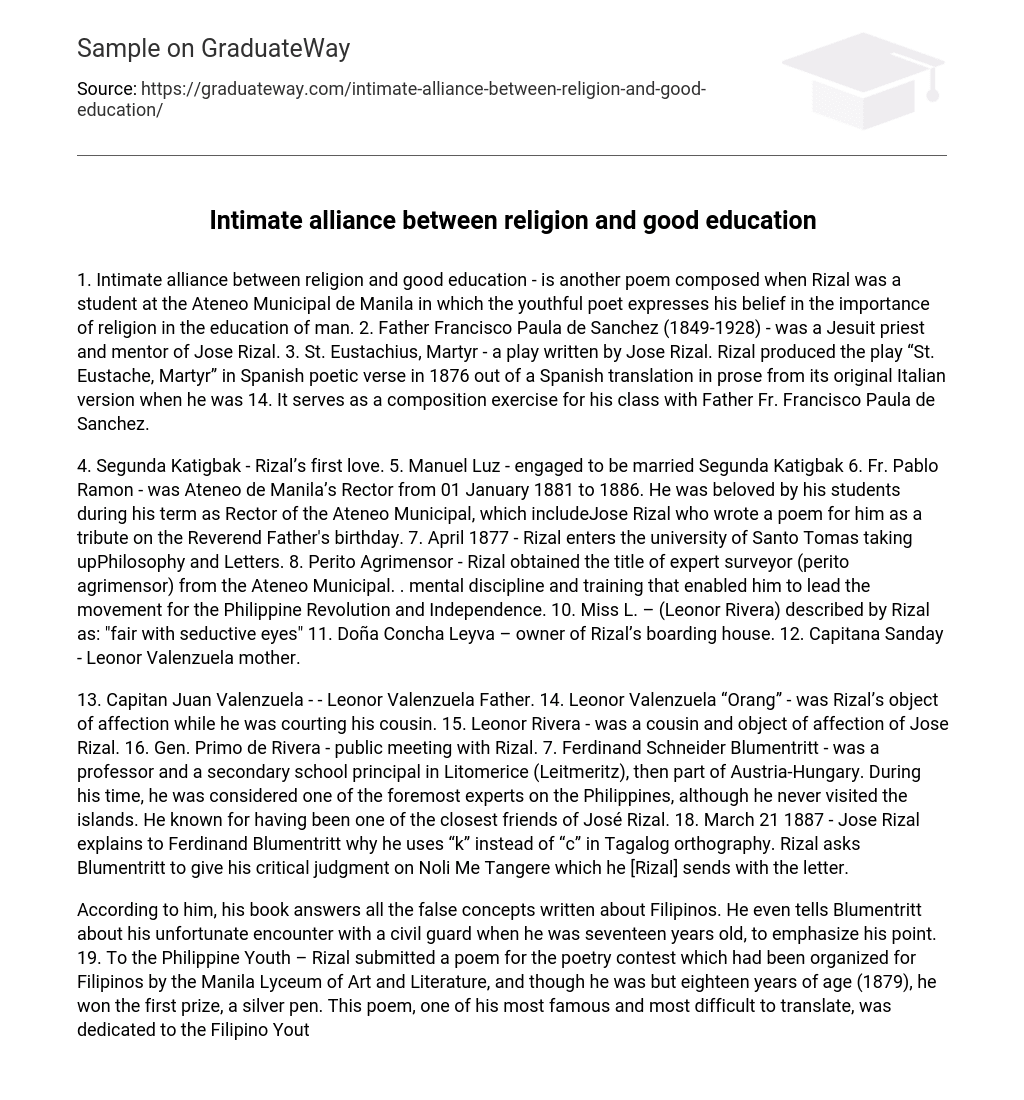- Intimate alliance between religion and good education – is another poem composed when Rizal was a student at the Ateneo Municipal de Manila in which the youthful poet expresses his belief in the importance of religion in the education of man.
- Father Francisco Paula de Sanchez (1849-1928) – was a Jesuit priest and mentor of Jose Rizal.
- St. Eustachius, Martyr – a play written by Jose Rizal. Rizal produced the play “St. Eustache, Martyr” in Spanish poetic verse in 1876 out of a Spanish translation in prose from its original Italian version when he was 14. It serves as a composition exercise for his class with Father Fr. Francisco Paula de Sanchez.
- Segunda Katigbak – Rizal’s first love.
- Manuel Luz – engaged to be married Segunda Katigbak
- Fr. Pablo Ramon – was Ateneo de Manila’s Rector from 01 January 1881 to 1886. He was beloved by his students during his term as Rector of the Ateneo Municipal, which includeJose Rizal who wrote a poem for him as a tribute on the Reverend Father’s birthday.
- April 1877 – Rizal enters the university of Santo Tomas taking upPhilosophy and Letters.
- Perito Agrimensor – Rizal obtained the title of expert surveyor (perito agrimensor) from the Ateneo Municipal.
- mental discipline and training that enabled him to lead the movement for the Philippine Revolution and Independence.
- Miss L. – (Leonor Rivera) described by Rizal as: “fair with seductive eyes”
- Doña Concha Leyva – owner of Rizal’s boarding house.
- Capitana Sanday – Leonor Valenzuela mother.
- Capitan Juan Valenzuela – Leonor Valenzuela Father.
- Leonor Valenzuela “Orang” – was Rizal’s object of affection while he was courting his cousin.
- Leonor Rivera – was a cousin and object of affection of Jose Rizal.
- Gen. Primo de Rivera – public meeting with Rizal.
- Ferdinand Schneider Blumentritt – was a professor and a secondary school principal in Litomerice (Leitmeritz), then part of Austria-Hungary. During his time, he was considered one of the foremost experts on the Philippines, although he never visited the islands. He known for having been one of the closest friends of José Rizal.
- March 21 1887 – Jose Rizal explains to Ferdinand Blumentritt why he uses “k” instead of “c” in Tagalog orthography. Rizal asks Blumentritt to give his critical judgment on Noli Me Tangere which he [Rizal] sends with the letter. According to him, his book answers all the false concepts written about Filipinos. He even tells Blumentritt about his unfortunate encounter with a civil guard when he was seventeen years old, to emphasize his point.
- To the Philippine Youth – Rizal submitted a poem for the poetry contest which had been organized for Filipinos by the Manila Lyceum of Art and Literature, and though he was but eighteen years of age (1879), he won the first prize, a silver pen. This poem, one of his most famous and most difficult to translate, was dedicated to the Filipino Youth.
- A la juventud filipina – a poem written in Spanish by Filipino writer and national hero José Rizal, first presented in 1879 in Manila, while he was studying at the University of Santo Tomas.
- Meztizos – Rizal won the special prize.
- El Consejo de los Dioses – a play written in Spanish by José Rizal, first published in 1880 inManila by the Liceo Artistico Literario de Manila in 1880, and later by La Solidaridad in 1883. El Consejo de los Dioses was written by Rizal when he was only nineteen years old, and reveals the humanistic education of the Philippines at the time and his answer to scholasticism.
Jose Rizal Is a Filipino Poet, Writer and Publicist
This article discusses various aspects of the life and works of Jose Rizal, a Filipino national hero. It covers his beliefs in the importance of religion in education, his mentors and teachers, his first love Segunda Katigbak, and his object of affection Leonor Rivera. It also mentions his notable works such as the play St. Eustache Martyr” and the poem “To the Philippine Youth”. The article also mentions Rizal’s encounter with a civil guard and his submission of a poem at the Manila Lyceum of Art and Literature where he won the first prize. Lastly, it discusses Rizal’s play “El Consejo de los Dioses” and how it reflects the humanistic education of the Philippines during that time.”
Cite this page
Jose Rizal Is a Filipino Poet, Writer and Publicist. (2016, Oct 16). Retrieved from
https://graduateway.com/intimate-alliance-between-religion-and-good-education/





